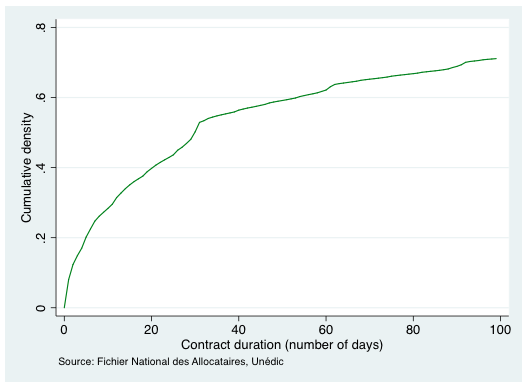The spread of temporary jobs of short duration is an important concern in countries with stringent employment protection legislation, especially France, Italy, Portugal, and Spain. In these countries, the open-ended contract is the normal form of employment contract. It has no fixed term. But the breach of open-ended contracts is costly for employers, who must fulfil complex procedures and provide severance payments. When the expected duration of jobs is short, employers are allowed to use temporary contracts that stipulate their termination date.
In practice, legal rules require that employers remunerate workers until the termination date of temporary contracts, but there is no red-tape separation cost at the termination date. The regulation of temporary contracts aims to stabilise employment and reduce the uncertainty for workers hired on jobs of short expected duration. However, the success of this regulation is questionable – temporary contracts account for most job flows in France, Italy, Portugal and Spain, because employers avoid open-ended contracts. The duration of most of these temporary contracts is very short. For instance, Figure 1 shows that about 50% of temporary contracts are shorter than one month in France.
Figure 1. Cumulative density of temporary contracts durations in temporary jobs inflows in France over the period 2010-2012
Given this situation, it has been argued that allowing employers to use open-ended contracts without (or with very small) layoff costs for separations occurring at short tenure instead of temporary contracts would reduce job turnover and foster employment (Bentolila et al. 2010, OECD 2014, Dolado et al. 2015). But this type of structural reform is difficult to implement and several European countries have decided to tax temporary contracts to induce employers to lengthen job durations. Temporary contracts of short duration are especially targeted in France since 2013, in Portugal since 2014 and in Spain since 2009, while all temporary contracts are taxed in Italy since 2012.1 As far as we are aware, almost nothing is known about the consequences of such policies, which nonetheless have non-trivial effects.
Our study provides a simple model, inspired by Cahuc et al. (2016a), which shows that taxation of temporary contracts does not always reduce job turnover (Cahuc et al. 2016b). Obviously, the taxation of contracts of short duration may induce employers to substitute contracts of longer duration for contracts of shorter duration and to transform temporary contracts into open-ended contracts if this allows them to avoid the tax. This effect is amplified if the tax is refunded when temporary contracts are transformed into open-ended contracts. The reduction of job instability can also be amplified if higher taxes on temporary contracts of short duration are offset by lower taxes on temporary contracts of long duration and on open-ended contracts. But higher taxes have opposing effects on the duration of temporary contracts. For instance, it is unlikely that seven-day contracts are transformed into one month contracts in response to a tax increase on contracts shorter than one month, but it can be optimal to reduce the duration of contracts from seven days to six days, because employers have incentives to reduce the length of temporary contracts when they are less profitable. Hence, higher taxes on temporary contracts do not necessarily reduce job instability. Their impact on job stability, employment, and welfare depends on the design of the tax scheme and on the empirical context.
The estimation of our model on French data allows us to run simulations to evaluate the impact of different tax systems on the distribution of employment spells, on unemployment, and on the welfare of unemployed workers. In all systems that we analyse, the receipt of the tax on temporary contracts is paid back to firms with a lump-sum subsidy to all jobs.
We find that the taxation of temporary contracts has a negative impact on the labour market. First, it reduces the mean duration of jobs. Hence, the taxation of temporary contracts does not achieve its main objective, which is to reduce labour turnover. Second, the tax decreases job creation, increases unemployment and reduces the welfare of unemployed workers. It is possible that other tax schedules depending on contract duration marginally improve labour market performance. But our exercises show that taxes on temporary contracts have complex effects that depend on specific features of each labour market. All in all, it is unlikely that this tool is suited to improve labour market performance with a reasonable level of confidence.
From this perspective, we analyse the consequence of the introduction of an open-ended contract with no termination cost for separations occurring at short tenure. This type of structural reform is akin to the Italian Job Act which has introduced an open-ended contract with protection increasing with tenure.2 We find that this type of reform is more appropriate than the taxation of temporary jobs. It increases the duration of jobs of short duration, raises employment and improves the welfare of unemployed workers. This suggests that an intricate system combining taxes and regulations that imposes temporary contracts for jobs of short duration is less efficient and less favourable to employment and to unemployed workers than a simple regulation comprising an open-ended contract without layoff costs for separations occurring at short tenure.
References
Bentolila, S, T Boeri and P Cahuc (2010), “Ending the Scourge of Dual Labour Markets in Europe”, VoxEU.org, 12 July.
Cahuc, P, O Charlot, and F Malherbet (2016a), “Explaining the Spread of Temporary Jobs and its Impact on Labor Turnover”, International Economic Review, 57(2), 533-572.
Cahuc, P, O Charlot, F Malherbet, H Benghalem, and E Limon (2016b) “Taxation of Temporary Jobs: Good Intentions With Bad Outcomes?”, CEPR Discussion Paper 11628.
Dolado, J, E Lalé, and N Siassi (2015), “Moving towards a Single Labour Contract: Transition vs. Steady State”, CEPR Discussion Paper 11030.
OECD (2014), Employment Outlook 2014.
Endnotes
[1] More precisely, in France the tax is equal to 3% of gross wages for temporary contracts shorter than one month, and equal to 1.5% for those from 1 to 3 months. It is refunded if the temporary contract is transformed into an open-ended contract. Portugal has increased the employers’ rate of social contribution by 4% for temporary contracts of durations shorter than 15 days. In Spain, unemployment insurance contributions are higher for temporary contracts than for permanent contracts since 1997. Since 2009, a supplementary employer social contribution, equal to 36% of gross wages, for temporary contracts of duration shorter than a week has been introduced. In Italy, a tax on all temporary contracts equal to 1.4% of gross wages is used to finance unemployment benefits since the reform enacted in 2012. The tax is refunded if temporary contracts are transformed into open-ended contracts. The amount of the refund is limited to the last six monthly payments of the tax.
[2] The Italian law 183/2014 introduced a new open-ended contract (contratto a tutele crescenti) for new hires with protection increasing with tenure.










